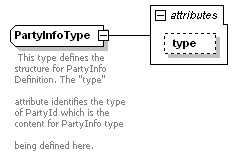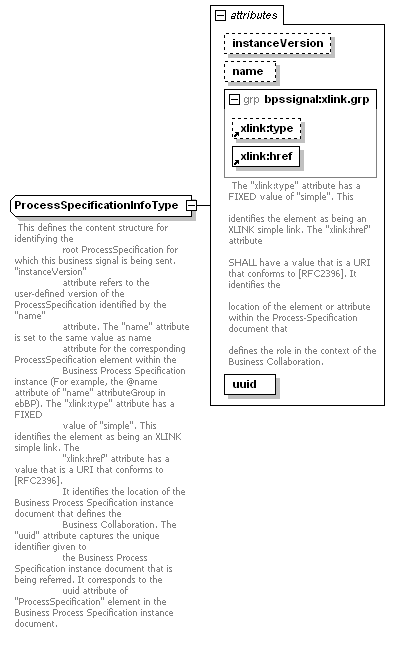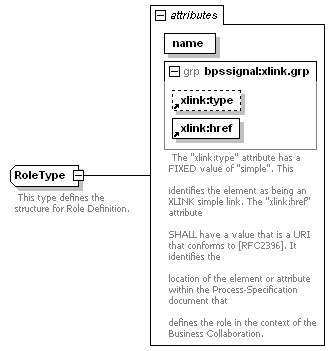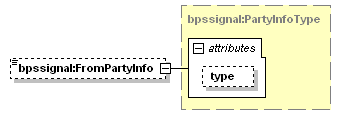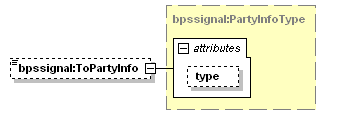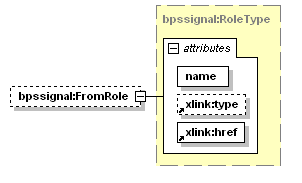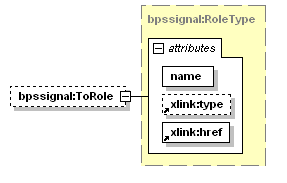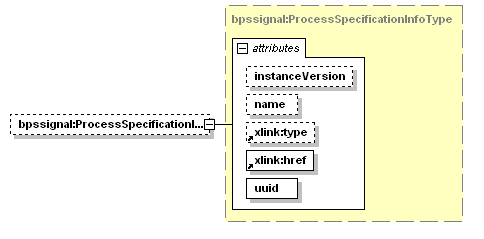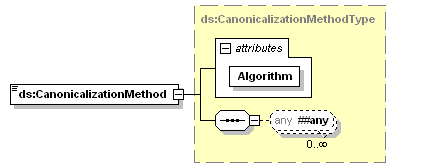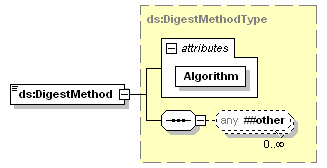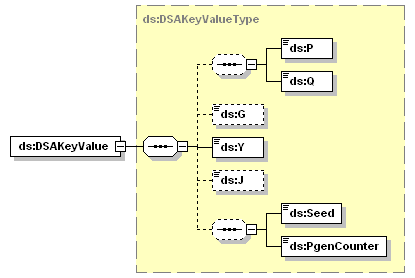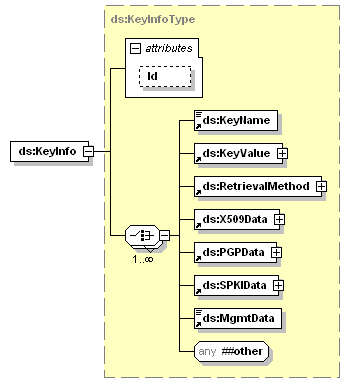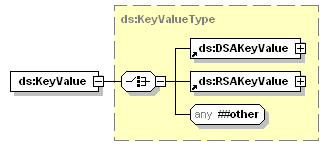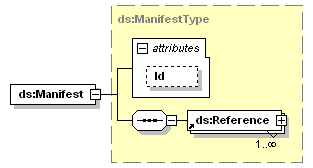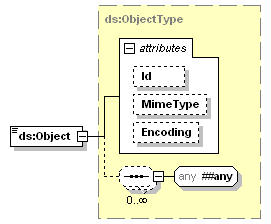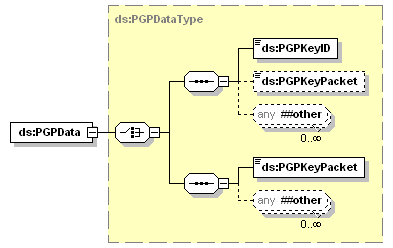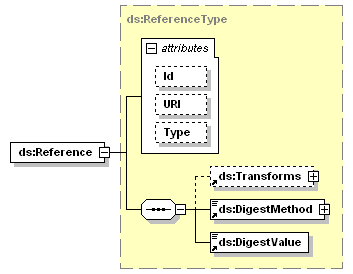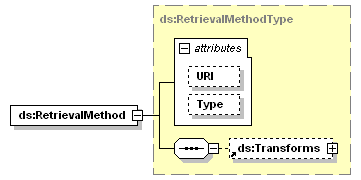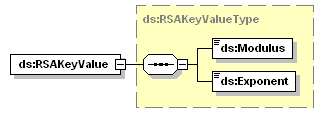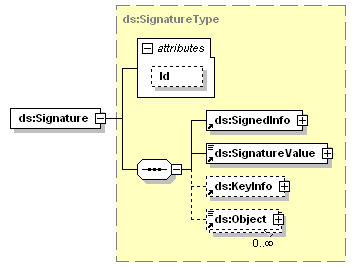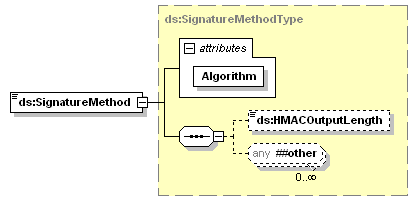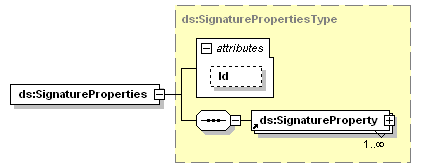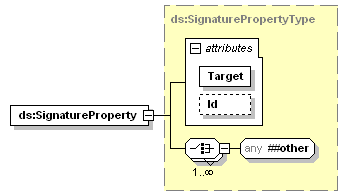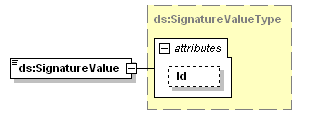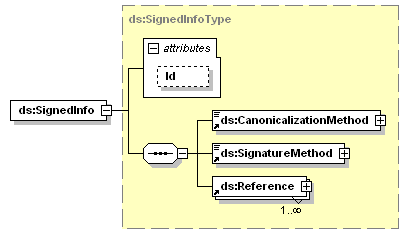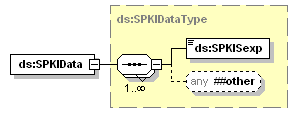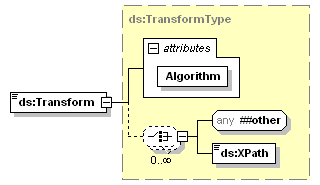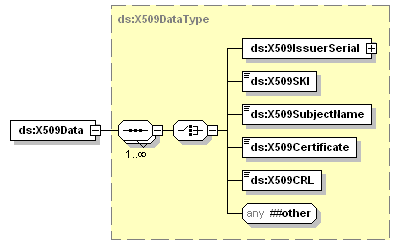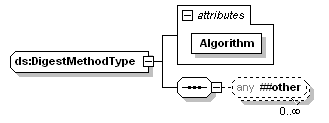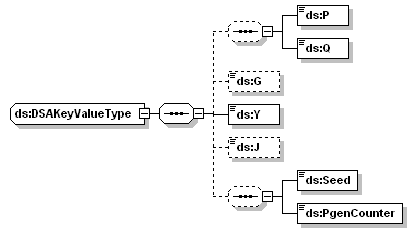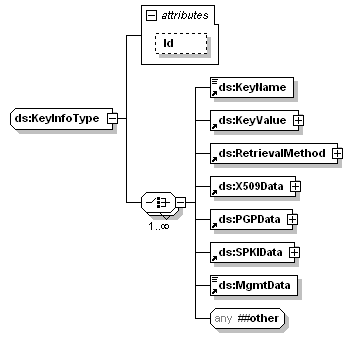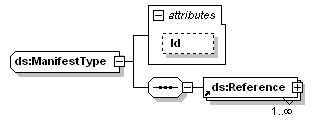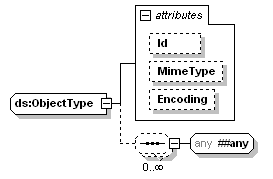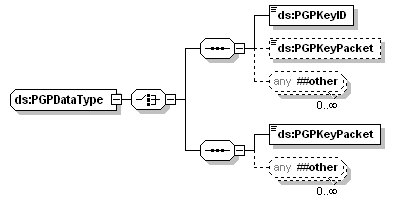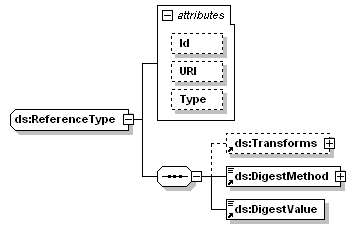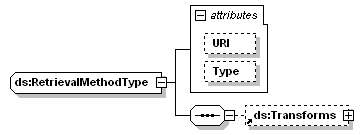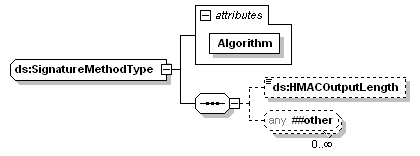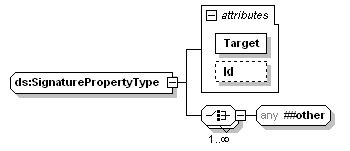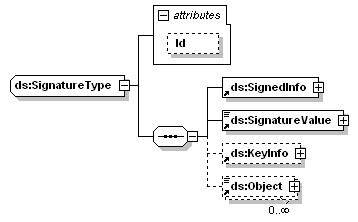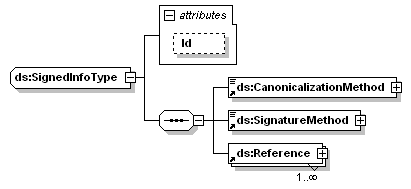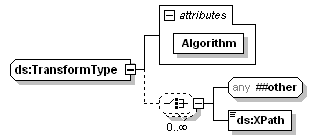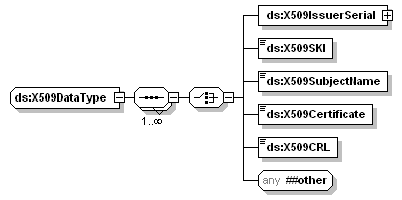| diagram |
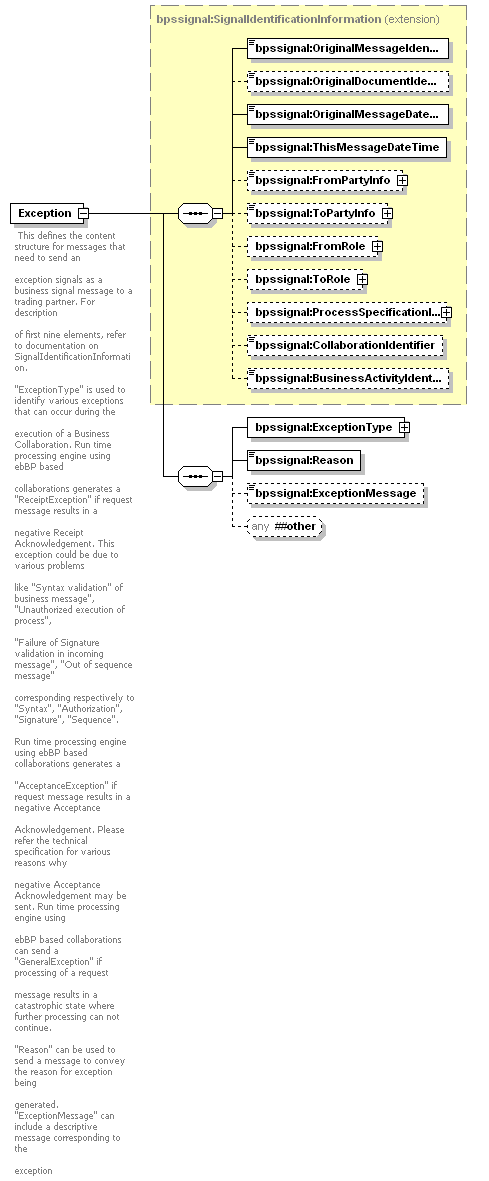 |
| namespace |
http://docs.oasis-open.org/ebxml-bp/ebbp-signals-2.0 |
| type |
extension of bpssignal:SignalIdentificationInformation |
| properties |
|
| children |
bpssignal:OriginalMessageIdentifier bpssignal:OriginalDocumentIdentifier bpssignal:OriginalMessageDateTime bpssignal:ThisMessageDateTime bpssignal:FromPartyInfo bpssignal:ToPartyInfo bpssignal:FromRole bpssignal:ToRole bpssignal:ProcessSpecificationInfo bpssignal:CollaborationIdentifier bpssignal:BusinessActivityIdentifier bpssignal:ExceptionType bpssignal:Reason bpssignal:ExceptionMessage |
| annotation |
| documentation | This defines the content structure for messages that need to send an
exception signals as a business signal message to a trading partner. For description
of first nine elements, refer to documentation on SignalIdentificationInformation.
"ExceptionType" is used to identify various exceptions that can occur during the
execution of a Business Collaboration. Run time processing engine using ebBP based
collaborations generates a "ReceiptException" if request message results in a
negative Receipt Acknowledgement. This exception could be due to various problems
like "Syntax validation" of business message", "Unauthorized execution of process",
"Failure of Signature validation in incoming message", "Out of sequence message"
corresponding respectively to "Syntax", "Authorization", "Signature", "Sequence".
Run time processing engine using ebBP based collaborations generates a
"AcceptanceException" if request message results in a negative Acceptance
Acknowledgement. Please refer the technical specification for various reasons why
negative Acceptance Acknowledgement may be sent. Run time processing engine using
ebBP based collaborations can send a "GeneralException" if processing of a request
message results in a catastrophic state where further processing can not continue.
"Reason" can be used to send a message to convey the reason for exception being
generated. "ExceptionMessage" can include a descriptive message corresponding to the
exception |
|
| source |
<xsd:element name="Exception">
<xsd:annotation>
<xsd:documentation> This defines the content structure for messages that need to send an
exception signals as a business signal message to a trading partner. For description
of first nine elements, refer to documentation on SignalIdentificationInformation.
"ExceptionType" is used to identify various exceptions that can occur during the
execution of a Business Collaboration. Run time processing engine using ebBP based
collaborations generates a "ReceiptException" if request message results in a
negative Receipt Acknowledgement. This exception could be due to various problems
like "Syntax validation" of business message", "Unauthorized execution of process",
"Failure of Signature validation in incoming message", "Out of sequence message"
corresponding respectively to "Syntax", "Authorization", "Signature", "Sequence".
Run time processing engine using ebBP based collaborations generates a
"AcceptanceException" if request message results in a negative Acceptance
Acknowledgement. Please refer the technical specification for various reasons why
negative Acceptance Acknowledgement may be sent. Run time processing engine using
ebBP based collaborations can send a "GeneralException" if processing of a request
message results in a catastrophic state where further processing can not continue.
"Reason" can be used to send a message to convey the reason for exception being
generated. "ExceptionMessage" can include a descriptive message corresponding to the
exception </xsd:documentation>
</xsd:annotation>
<xsd:complexType>
<xsd:complexContent>
<xsd:extension base="bpssignal:SignalIdentificationInformation">
<xsd:sequence>
<xsd:element name="ExceptionType">
<xsd:complexType>
<xsd:choice>
<xsd:element name="ReceiptException">
<xsd:simpleType>
<xsd:restriction base="xsd:string">
<xsd:enumeration value="Syntax"/>
<xsd:enumeration value="Authorization"/>
<xsd:enumeration value="Signature"/>
<xsd:enumeration value="Sequence"/>
</xsd:restriction>
</xsd:simpleType>
</xsd:element>
<xsd:element name="AcceptanceException">
<xsd:simpleType>
<xsd:restriction base="xsd:string">
<xsd:enumeration value="Business"/>
<xsd:enumeration value="Performance"/>
</xsd:restriction>
</xsd:simpleType>
</xsd:element>
<xsd:element name="GeneralException">
<xsd:simpleType>
<xsd:restriction base="xsd:string"/>
</xsd:simpleType>
</xsd:element>
</xsd:choice>
</xsd:complexType>
</xsd:element>
<xsd:element name="Reason" type="bpssignal:non-empty-string"/>
<xsd:element name="ExceptionMessage" type="bpssignal:non-empty-string" minOccurs="0"/>
<xsd:any namespace="##other" minOccurs="0"/>
</xsd:sequence>
</xsd:extension>
</xsd:complexContent>
</xsd:complexType>
</xsd:element> |
| diagram |
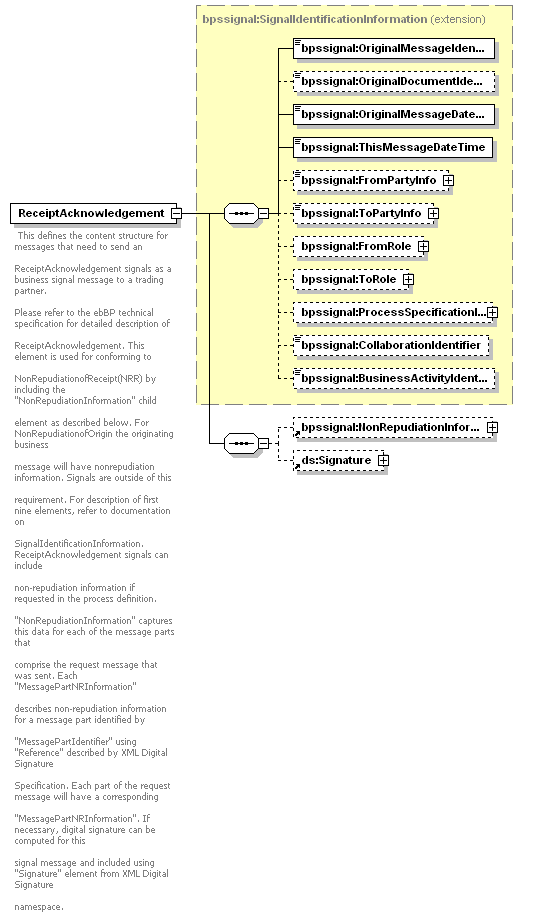 |
| namespace |
http://docs.oasis-open.org/ebxml-bp/ebbp-signals-2.0 |
| type |
extension of bpssignal:SignalIdentificationInformation |
| properties |
|
| children |
bpssignal:OriginalMessageIdentifier bpssignal:OriginalDocumentIdentifier bpssignal:OriginalMessageDateTime bpssignal:ThisMessageDateTime bpssignal:FromPartyInfo bpssignal:ToPartyInfo bpssignal:FromRole bpssignal:ToRole bpssignal:ProcessSpecificationInfo bpssignal:CollaborationIdentifier bpssignal:BusinessActivityIdentifier bpssignal:NonRepudiationInformation ds:Signature |
| annotation |
| documentation | This defines the content structure for messages that need to send an
ReceiptAcknowledgement signals as a business signal message to a trading partner.
Please refer to the ebBP technical specification for detailed description of
ReceiptAcknowledgement. This element is used for conforming to
NonRepudiationofReceipt(NRR) by including the "NonRepudiationInformation" child
element as described below. For NonRepudiationofOrigin the originating business
message will have nonrepudiation information. Signals are outside of this
requirement. For description of first nine elements, refer to documentation on
SignalIdentificationInformation. ReceiptAcknowledgement signals can include
non-repudiation information if requested in the process definition.
"NonRepudiationInformation" captures this data for each of the message parts that
comprise the request message that was sent. Each "MessagePartNRInformation"
describes non-repudiation information for a message part identified by
"MessagePartIdentifier" using "Reference" described by XML Digital Signature
Specification. Each part of the request message will have a corresponding
"MessagePartNRInformation". If necessary, digital signature can be computed for this
signal message and included using "Signature" element from XML Digital Signature
namespace. |
|
| source |
<xsd:element name="ReceiptAcknowledgement">
<xsd:annotation>
<xsd:documentation> This defines the content structure for messages that need to send an
ReceiptAcknowledgement signals as a business signal message to a trading partner.
Please refer to the ebBP technical specification for detailed description of
ReceiptAcknowledgement. This element is used for conforming to
NonRepudiationofReceipt(NRR) by including the "NonRepudiationInformation" child
element as described below. For NonRepudiationofOrigin the originating business
message will have nonrepudiation information. Signals are outside of this
requirement. For description of first nine elements, refer to documentation on
SignalIdentificationInformation. ReceiptAcknowledgement signals can include
non-repudiation information if requested in the process definition.
"NonRepudiationInformation" captures this data for each of the message parts that
comprise the request message that was sent. Each "MessagePartNRInformation"
describes non-repudiation information for a message part identified by
"MessagePartIdentifier" using "Reference" described by XML Digital Signature
Specification. Each part of the request message will have a corresponding
"MessagePartNRInformation". If necessary, digital signature can be computed for this
signal message and included using "Signature" element from XML Digital Signature
namespace. </xsd:documentation>
</xsd:annotation>
<xsd:complexType>
<xsd:complexContent>
<xsd:extension base="bpssignal:SignalIdentificationInformation">
<xsd:sequence>
<xsd:element ref="bpssignal:NonRepudiationInformation" minOccurs="0"/>
<xsd:element ref="ds:Signature" minOccurs="0"/>
</xsd:sequence>
</xsd:extension>
</xsd:complexContent>
</xsd:complexType>
</xsd:element> |
| diagram |
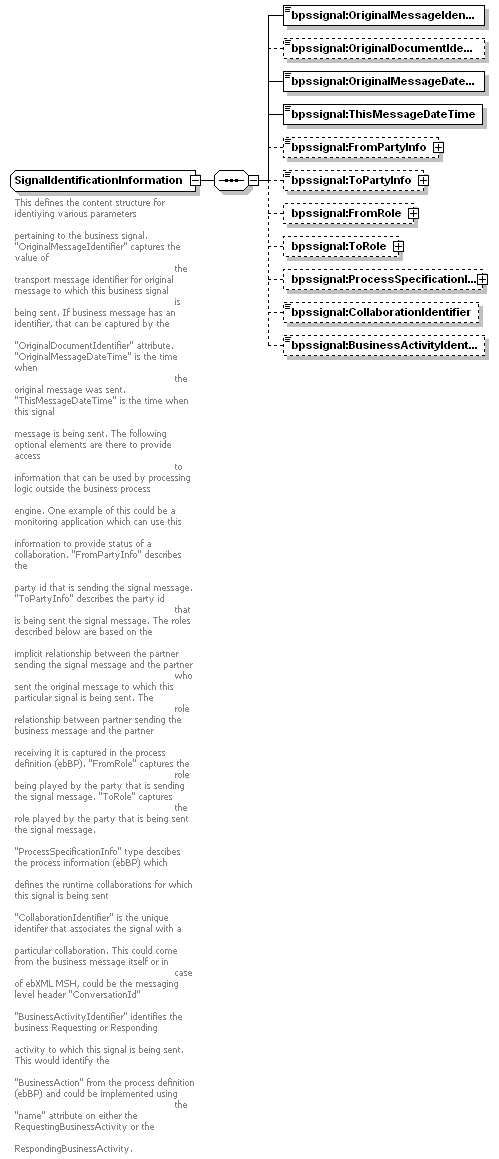 |
| namespace |
http://docs.oasis-open.org/ebxml-bp/ebbp-signals-2.0 |
| children |
bpssignal:OriginalMessageIdentifier bpssignal:OriginalDocumentIdentifier bpssignal:OriginalMessageDateTime bpssignal:ThisMessageDateTime bpssignal:FromPartyInfo bpssignal:ToPartyInfo bpssignal:FromRole bpssignal:ToRole bpssignal:ProcessSpecificationInfo bpssignal:CollaborationIdentifier bpssignal:BusinessActivityIdentifier |
| used by |
|
| annotation |
| documentation | This defines the content structure for identiying various parameters
pertaining to the business signal. "OriginalMessageIdentifier" captures the value of
the transport message identifier for original message to which this business signal
is being sent. If business message has an identifier, that can be captured by the
"OriginalDocumentIdentifier" attribute. "OriginalMessageDateTime" is the time when
the original message was sent. "ThisMessageDateTime" is the time when this signal
message is being sent. The following optional elements are there to provide access
to information that can be used by processing logic outside the business process
engine. One example of this could be a monitoring application which can use this
information to provide status of a collaboration. "FromPartyInfo" describes the
party id that is sending the signal message. "ToPartyInfo" describes the party id
that is being sent the signal message. The roles described below are based on the
implicit relationship between the partner sending the signal message and the partner
who sent the original message to which this particular signal is being sent. The
role relationship between partner sending the business message and the partner
receiving it is captured in the process definition (ebBP). "FromRole" captures the
role being played by the party that is sending the signal message. "ToRole" captures
the role played by the party that is being sent the signal message.
"ProcessSpecificationInfo" type descibes the process information (ebBP) which
defines the runtime collaborations for which this signal is being sent
"CollaborationIdentifier" is the unique identifer that associates the signal with a
particular collaboration. This could come from the business message itself or in
case of ebXML MSH, could be the messaging level header "ConversationId"
"BusinessActivityIdentifier" identifies the business Requesting or Responding
activity to which this signal is being sent. This would identify the
"BusinessAction" from the process definition (ebBP) and could be implemented using
the "name" attribute on either the RequestingBusinessActivity or the
RespondingBusinessActivity. |
|
| source |
<xsd:complexType name="SignalIdentificationInformation">
<xsd:annotation>
<xsd:documentation>This defines the content structure for identiying various parameters
pertaining to the business signal. "OriginalMessageIdentifier" captures the value of
the transport message identifier for original message to which this business signal
is being sent. If business message has an identifier, that can be captured by the
"OriginalDocumentIdentifier" attribute. "OriginalMessageDateTime" is the time when
the original message was sent. "ThisMessageDateTime" is the time when this signal
message is being sent. The following optional elements are there to provide access
to information that can be used by processing logic outside the business process
engine. One example of this could be a monitoring application which can use this
information to provide status of a collaboration. "FromPartyInfo" describes the
party id that is sending the signal message. "ToPartyInfo" describes the party id
that is being sent the signal message. The roles described below are based on the
implicit relationship between the partner sending the signal message and the partner
who sent the original message to which this particular signal is being sent. The
role relationship between partner sending the business message and the partner
receiving it is captured in the process definition (ebBP). "FromRole" captures the
role being played by the party that is sending the signal message. "ToRole" captures
the role played by the party that is being sent the signal message.
"ProcessSpecificationInfo" type descibes the process information (ebBP) which
defines the runtime collaborations for which this signal is being sent
"CollaborationIdentifier" is the unique identifer that associates the signal with a
particular collaboration. This could come from the business message itself or in
case of ebXML MSH, could be the messaging level header "ConversationId"
"BusinessActivityIdentifier" identifies the business Requesting or Responding
activity to which this signal is being sent. This would identify the
"BusinessAction" from the process definition (ebBP) and could be implemented using
the "name" attribute on either the RequestingBusinessActivity or the
RespondingBusinessActivity.</xsd:documentation>
</xsd:annotation>
<xsd:sequence>
<xsd:element name="OriginalMessageIdentifier" type="bpssignal:non-empty-string"/>
<xsd:element name="OriginalDocumentIdentifier" type="bpssignal:non-empty-string" minOccurs="0"/>
<xsd:element name="OriginalMessageDateTime" type="xsd:dateTime"/>
<xsd:element name="ThisMessageDateTime" type="xsd:dateTime"/>
<xsd:element name="FromPartyInfo" type="bpssignal:PartyInfoType" minOccurs="0"/>
<xsd:element name="ToPartyInfo" type="bpssignal:PartyInfoType" minOccurs="0"/>
<xsd:element name="FromRole" type="bpssignal:RoleType" minOccurs="0"/>
<xsd:element name="ToRole" type="bpssignal:RoleType" minOccurs="0"/>
<xsd:element name="ProcessSpecificationInfo" type="bpssignal:ProcessSpecificationInfoType" minOccurs="0"/>
<xsd:element name="CollaborationIdentifier" type="bpssignal:non-empty-string" minOccurs="0"/>
<xsd:element name="BusinessActivityIdentifier" type="bpssignal:non-empty-string" minOccurs="0"/>
</xsd:sequence>
</xsd:complexType> |






